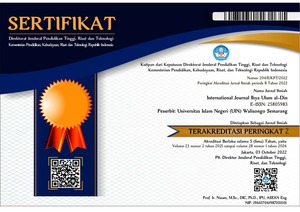Hermeneutics of Reception by Hans Robert Jauss: An Alternative Approach Toward Quranic Studies
DOI:
https://doi.org/10.21580/ihya.24.2.13092Keywords:
Aesthetic Experience, Hermeneutics, Horizon, ReceptionAbstract
This research attempts to offer hermeneutics of reception by Hans Robert Jauss as an alternative to understanding the Quran. Starting from the concern of some contemporary Islamic thinkers about the limitations of the classical Quran in overcoming human problems that are always dynamic, hermeneutics has become a much-demanded approach. In addition, the methodological principle of classical interpretation tends to forget the role of human participation in interpreting the Quran. Nevertheless, the practice of the reception approach has stagnated in the study of the living Quran, which only performs a simple analysis of a tradition into three reception typologies: exegesis, functional, and aesthetic, without any more profound critique. This article aims to describe Hans Robert Jauss’ hermeneutics of reception as a relevant offer to fill the void of Quranic studies from the reader's perspective. For this reason, this article is compiled using qualitative methods based on literature studies so that essential aspects that need to be considered as material for hermeneutics of reception analysis can be well elaborated. There are three crucial aspects to the hermeneutics of reception; the Horizon of expectations, the three levels of reading, and the validity of the aesthetic experience.
Downloads
References
Abshor, M. U. (2019). Resepsi al-Qur’an MGemawang Mlati Yogyakarta. Qof, 3(1), 41–54.
Al-Qaththan, M. (n.d.). Mabahits fi ’Ulumi Al-Quran. Dar Al-Ilmi Wa Al-Iman.
Asna, L. (2021). The Hermeneutics of Reception Toward Social Media Ethics in KH. Taufiqul Hakim’s Interpretation on Chapter Al-Hujurat Verses 6 and 10-13 (A Study of Tafseer Al-Mubarok). UIN Walisongo Semarang.
Dzakiy, A. F. (2016). Hadadis dan Resepsi Estetis Pesantren (Studi Kitab Fada’il Ramadan Karya Taufiqul Hakim). Analisis, XVI(1), 225–244. https://doi.org/https://doi.org/10.24042/ajsk.v16i1.744
Hardiman, F. B. (2015). Seni Memahami (Hermeneutik dari Schleiermacher sampai Derida). PT. Kanisius.
Hasbillah, A. U. (2019). Ilmu Living Quran-Hadis: Ontologi, Epistemologi, dan Aksiologi. Yayasan Wakaf Darus-Sunnah.
Jauss, H. R., & Benzinger, E. (1970). Literary History as a Challenge to Literary Theory. In New Literary History (Vol. 2, Issue 1, p. 7). The Johns Hopkins University Press. https://doi.org/10.2307/468585.
Jauss, H. R. translated by S. M. (1984). Literary History as a Challenge to Literary Theory. In New direciton in Literary History (Vol. 3, Issue 1). University of Minnesota Press. https://doi.org/10.2307/1347336.
Jauss, Hans R., translated by Bahti, T. (1983). Toward an Aesthetic of Reception. In The Journal of Aesthetics and Art Criticism (Vol. 41, Issue 3). The University of Minnesota Press. https://doi.org/10.2307/430119.
Junus, U. (1985). Resepsi Sastra Sebuah Pengantar. Gramedia.
Lawrence, B. (2006). The Qur’an: A Biography. Publisher Group West.
Parris, D. (1999). Reception Theory: Philosophical Hermeneutics, Literary Theory, and Biblical Interpretation (Issue June). The University of Nottingham.
Rafiq, A. (2014). The Reception of the Qur’an in Indonesia: A Case Study of the Place of the Qur’an in a Non-Arabic Speaking Community. The Temple University Graduate Board.
Rahmat, P. S. (2019). Resume Ragam Penelitian Kualitatif. Jurnal Equilibrium, 5, 1–8. https://doi.org/10.31227/osf.io/wtncz.
Ratna, N. K. (2017). Etika Sastra dan Budaya. Pustaka Pelajar.
Saeed, A. (2017). Paradigma, Prinsip, dan Metode Penafsiran Kontekstualitas al-Quran (L. translated by Iffah & A. Henri, Eds.). Lembaga Ladan Kata.
Setiawan, N. K. (2005). Al-Qur’an Kitab Sastra Terbesar. eLSAQ Press.
Shihab, M. Q. (2015). Kaidah Tafsir: Syarat, Ketentuan, dan Aturan yang Patut Anda Ketahui dalam Memahami Al-Qur’an. Lentera Hati.
Sugiono. (2015). Metode Penelitian Kuantitatif, Kualitatif, dan RD. Penerbit Alfabeta.
Sujarwa. (2012). Perihal Tujuh Tesis Jauss dalam Teori Estetika Resepsi. Jurnal Litraya, 5(1), 61–66.
Syamsuddin, S. (2017). Hermeneutika dan Pengembangan Ulumul Qur’an (Edisi Revi). Pesantren Nawesea Press.
Downloads
Published
How to Cite
Issue
Section
License
By submitting an article to the journal, the author(s) agree to transfer the published article's copyright to the journal, which will act as the publisher. This means the journal will have the right to publish the article in various forms, including reprints. The journal will maintain the publishing rights to the published articles.
This work is licensed under Creative Commons Attribution-ShareAlike 4.0 International License.
In line with the license, authors and third parties (readers, researchers, and others) are allowed to share and adapt the material. In addition, the material must be given appropriate credit, provided with a link to the license, and indicated if changes were made. If authors remix, transform or build upon the material, authors must distribute their contributions under the same license as the original.



